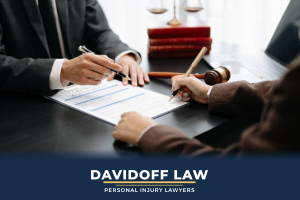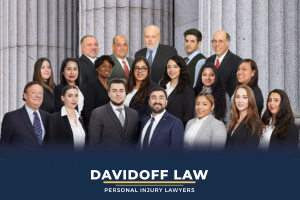Understanding the Statute of Limitations in New York

When you get hurt, or your property gets damaged because of someone else's actions, you have a limited time to take them to court. This time limit is what we call the "statute of limitations." In New York, these time limits vary depending on your case type. Common examples include being in a car accident or if someone broke a contract with you.
Knowing these rules is vital because if you wait too long, you could forfeit your chance to file a lawsuit and pursue compensation you might be owed. At Davidoff Law Personal Injury Lawyers, we are familiar with the New York personal injury statute of limitations period. Learn more about New York civil statute of limitations laws below. Then, contact us to schedule a free case consultation.
Table of Contents
Introduction to the Statute of Limitations
The statute of limitations is a set of rules that says how long you have to sue someone after their actions or inaction cause harm. It is a timer that starts running the day the incident occurs or when you find out you've been harmed. These rules are there to ensure the justice system is fair and that lawsuits are filed while memories and evidence remain fresh. Different types of cases are subject to different statutes of limitation, so it's important to know which one applies to your situation.
Overview of Statute of Limitations in New York
In New York state, the statute of limitations varies greatly depending on the type of case. For example, if you suffer an injury in an accident, you generally have three years to commence a lawsuit. But if a doctor makes a mistake and hurts you, you might have only two and a half years to sue. These time limits are in place to ensure that justice happens in a timely manner and that everyone involved can move on.
General Time Frames for Various Claims
Here's a quick breakdown of some common time frames in New York:
- Personal injury cases: Three years.
- Medical malpractice: Two and a half years, but can vary depending on the case.
- Damage to property: Three years. This should include accident product liability or accident property damage.
- Breach of contract: Six years for written contracts, four years for sales
Knowing these time frames is crucial because once the time limit passes, you can't sue, no matter how strong your case is. Keep in mind that criminal charges have different statutes of limitations. If an injury occurred, be mindful of the New York statute of limitations that might apply to your case. This includes everything from a car accident to a construction accident.
New York Extends The Statute of Limitations for Inappropriate Sexual Conduct and Sexual Assault

In New York, the rules about how long you have to sue someone if you're a victim of sexual assault have some specific deadlines known as the statute of limitations. This is critical for an offense involving misconduct of a sexual nature.
Before the Child Victims Act (CVA) was passed on January 28, 2019, people who were under 18 at the time of their assault had until they turned 23 to file a lawsuit. After the CVA came into effect, the age limit was extended, allowing survivors to file claims up until they turn 55. For adults who experienced sexual abuse, the standard time frame to take legal action used to be three years from the incident. However, a new law in 2019 expanded that period to 20 years for abuses that occurred after 2019, offering more time for survivors to seek justice and compensation.
Furthermore, the Adult Survivors Act (ASA), which came into effect on November 24, 2022, created a one-year window where the statute of limitations was paused. This meant that adult survivors of sexual assault had until November 23, 2023, to file a lawsuit, even if their original three-year period to sue had already passed. Survivors can claim various types of damages, including healthcare expenses and lost wages, as well as compensation for emotional distress and the impact on their quality of life.
Exceptions to the Statute of Limitations
Sometimes, the law gives you extra time beyond the normal limits. For example, if the person you want to sue leaves New York, the clock might stop until they return. Also, if the person harmed is a minor, they usually get more time to start their lawsuit, often until they turn 18. This could even be extended further by adding the standard time limit for their case after they turn 18. Our personal injury law firm can help you.
Tolling Provisions and Exceptions for Minors
"Tolling" means pausing or delaying the statute of limitations. In New York, if you're under 18 when you get hurt, you often have until three years after your 18th birthday to sue, but it can depend on the type of case. There are also special rules for cases involving crimes like aggravated sexual abuse, where victims have more time to sue because of the serious nature of these crimes.
It's also important to know that for medical malpractice cases involving minors, the clock might start ticking not from the injury date but from when the minor turns 18, although there are limits to this rule. This gives families and victims more time to understand the harm's full impact and seek justice.
The Importance of Acting Quickly

Even though you might have years to file a lawsuit, starting the process early is usually better. The sooner you start, the easier it is to gather evidence and find witnesses who remember what happened. Waiting too long can make it harder to build a strong case.
Plus, talking to a lawyer early on can help you understand your rights and how to protect them. A lawyer can tell you exactly how much time you have and can help make sure you don't miss any deadlines.
There Are Risks Associated With Waiting Too Long
Waiting too close to the deadline to start your lawsuit can be risky. Witnesses might move away or forget important details; evidence can get lost or become less reliable over time. You can't sue if you miss the deadline, even by a day.
This means you could end up paying for medical bills, repairs, or other costs alone, even if someone else was at fault. That's why it's crucial to pay attention to these time limits and act promptly.
Preparing Your Case Within the Time Limit
Getting your lawsuit started within the time limit means being organized and proactive. You'll need to gather evidence, like photos, medical records, and witness statements, and understand the details of your case. Working with a lawyer can help you manage all these tasks and ensure everything is ready on time.
A strong lawyer will also track deadlines and ensure your lawsuit is filed properly and on time. They can handle the legal stuff so you can focus on healing and moving forward.
Steps to Take if You're Approaching the Deadline

- Contact a Lawyer Immediately: If you think you might have a case, don't wait. A lawyer can quickly tell you if you have a valid claim.
- Gather Your Documents: Collect any documents pertaining to your case, like medical records or a police report. Your lawyer will need these to understand what happened.
- Keep Track of Communications: Save any emails or letters you get from insurance companies or anyone else involved in the incident.
- List Potential Witnesses: Make a record of the names and contact information of anyone who might have seen what happened or knows about your injuries.
- Take Photos: If you haven't already, photograph your injuries, any property damage, and the place where the incident happened.
- Write Down Everything You Remember: As soon as you can, write down everything you remember about how the injury or damage occurred.
- Avoid Public Statements: Don't talk about your case on social media or with anyone other than your lawyer to avoid saying something that could potentially harm your case.
How Davidoff Law Helps Navigate the Statute of Limitations
- Expert Guidance: Davidoff Law has experts in New York law who understand the ins and outs of the statute of limitations. We can advise you on the specific time limits for your case.
- Case Preparation: Our team can help gather evidence, organize documents, and prepare your case quickly to meet any deadlines.
- Avoiding Delays: We know how to handle paperwork and legal processes efficiently, reducing the risk of delays that could jeopardize your case.
- Negotiating with Insurance Companies: If dealing with insurance is part of your case, we can handle the negotiations to make sure you're treated fairly and within the time limits.
- Free Consultation: Davidoff Law offers a free consultation to discuss your case and how the statute of limitations might affect it, helping you make informed decisions about how to proceed.
Reach Out To Davidoff Law Personal Injury Lawyers Before the Statute of Limitations Expires

If you or someone you love has been hurt or had property damaged, understand that you don't have forever to ask for help from the courts. If you have sustained a severe physical injury, see a doctor first. Then, remember the law sets strict deadlines for commencing lawsuits, known as the statute of limitations. At Davidoff Law, we specialize in helping people like you navigate these complex rules and fight for the justice and compensation you deserve. Contact us today, and let's discuss how we can support you before time runs out.

